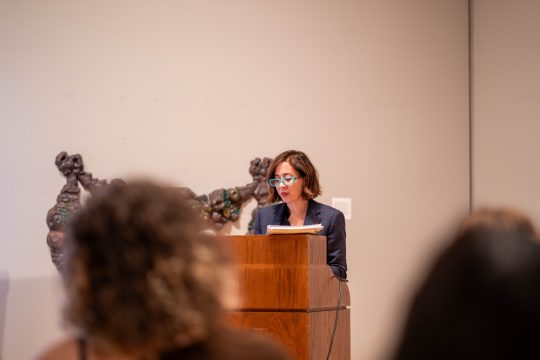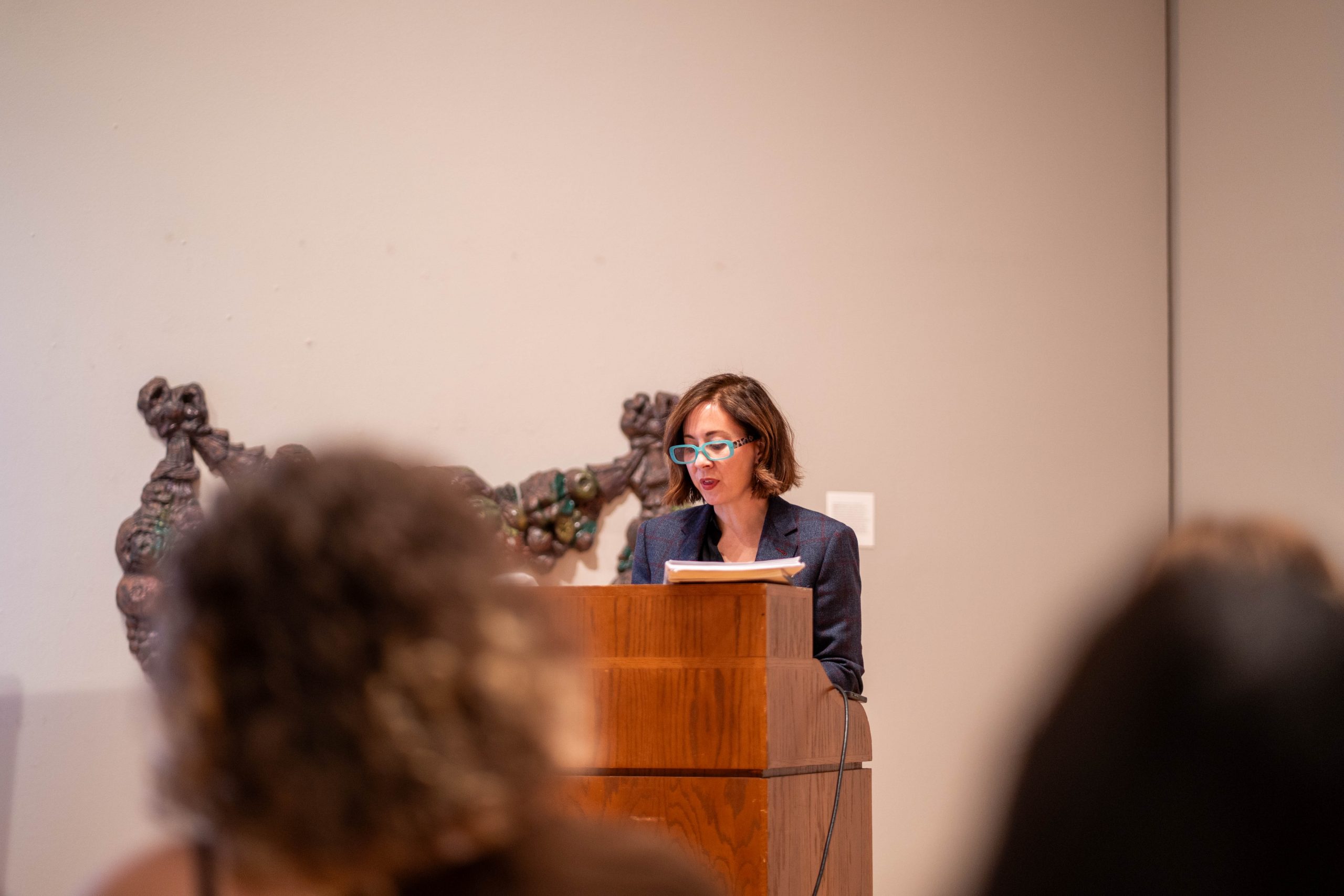On the evening of Thursday, Feb. 20, the Wriston Galleries hosted a reading by Paisley Rekdal, a hybrid poet and creative nonfiction (CNF) author. Her literary prestige is as voluminous as her subject matter. With a Guggenheim Fellowship and a Utah Poet Laureate position under her belt, she tackles sprawling terrains with a concise pen — most recently, the Transcontinental Railroad.
“West: A Translation” presents a Cantonese poem from the walls of Angel Island — a detention center in operation during the Chinese Exclusion Act. Across the barracks, immigrants carved poetry detailing their unjust captivity and homesickness. Many of the detainees were young laborers who braved the American west to support their families. Rekdal, drawn to the distance and frustration in these poems, also noticed an absence in the larger archives: in her research, no single preserved document articulates the perspective of Chinese laborers on the Transcontinental Railroad.

To surface this silence, Rekdal meticulously decomposes each of these characters into its own poem and footnote-style lyric essay. Translation here is a creative tool. “West” delves into both persona and the personal, resulting in a luminous and historical collection that elegizes the detainees with a cosmic reckoning. Rekdal’s main question that guided her writing was how America, as a country and a symbol, moves through time: forward along the tracks, or spiraling backwards into chaos and confinement. It’s a translation that supersedes language to blur history, ownership and labor.
Hybrid form plays a key role in articulating the vast landscapes the railroad cuts through. Rekdal visited Lawrence at an exciting time for the creative writing department: this winter term, Assistant Professor of English Austin Segrest is offering the first iteration of a poetry and CNF hybrid workshop. Rekdal is no stranger to this in-between genre. Through “West,” she speaks to the track with quicksilver diction while critically focusing on “truth” — a tenet of CNF. What truth is being shared, of course, changes from piece to piece. From migrant workers to Mormons, Rekdal’s cast of speakers reveals a mosaic of experiences surrounding the Transcontinental Railroad.
Since the state of Utah commissioned “West,” the work is also presented on a website. Rekdal began her reading by utilizing a projector to display the first video poem on the website — the only one not explicitly written in the book. It featured shots of the railroad while male voices, inferably laborers, announcing in English, Chinese, Shoshoni and many other languages: “This is the sound of a train.” This segued into the same Angel Island poem that appears at the beginning of the book.
Rekdal then opened the floor to the audience to decide where the reading would go. She rattled off the many personas and practices that appear in “West” — Chinese death rituals, presidential speeches and veteran train hoppers. “Sad,” for instance, contrasted the loose speeches of former president Andrew Johnson with the performative jabs of the current president, Donald Trump. The result is a contrapuntal poem that weaves these two disparate times through common threads of racism and exclusion. Rekdal even took to mimicking the audacious tone of Trump in her reading, oscillating between parody and reality.
Several other poems were read from the website. “What Day,” a favorite of mine, featured a queer reading of Chinese laborers along the Transcontinental Railroad. Given the lack of documentation and the homosocial nature of the railroad, Rekdal wanted to both invent and reveal these instances of intimacy. “What matter if you say / you’d never choose me were there / women willing / in this desert. I / chose,” the poem’s speaker cooed from the projector. This piece and many others across “West” resort to poetry to unearth these otherwise absent histories.
To conclude her reading, Rekdal showcased some of her newer work in her own, present voice outside of the archives. “What Is the Smell of a Circle?” was a panoply of both cruel and quiet memories surrounding her failed first marriage: arguing over an imagined child; attending a couples counselor; throwing every dish in the kitchen, never letting a shard touch or cut. In the violence of this reading, however, she offered streaks of tenderness. Always, she returned to the love that this partnership was built on — and how that alone was never enough.
While I was slated to interview Rekdal, a series of delayed flights forced us to cancel. Despite the exhaustion from travel and other technical difficulties in Wriston, she maintained her wit and charisma, paying compliments to Appleton’s many wonderful cafés and the gallery itself. Her presence was infectious; folks buzzed with excitement throughout the reading. Woodland Pattern, a Milwaukee-based poetry nonprofit, offered several of her works for sale, which she signed with glee.
Rekdal is a prime example of the importance of poetry in uncovering, yes, but also rerouting histories to speak into the present. Her reading was sponsored by the Mia Paul Poetry Fund.

